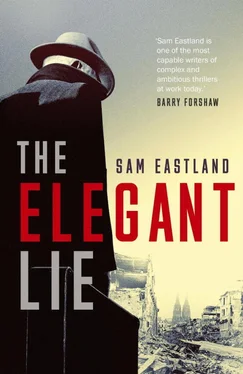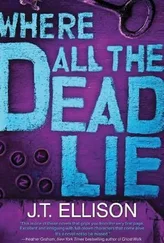As Carter closed his eyes and listened to the metallic swish of the scissors, the muscles in his back relaxed for the first time in so long he had mistaken them for bone. Suddenly, and catching him completely by surprise, tears spilled out of his eyes and ran down his cheeks.
The barber stopped his cutting, produced a clean handkerchief and dabbed away the tears. He made no comment, nor did he pause in his work for more than a couple of seconds. In a moment, he was back to snipping away tiny strands of hair raised up along the black, medicinal-smelling tines of the comb.
For the remainder of the haircut, Carter puzzled over why the tears had come. It was something about the peculiar anonymous gentleness with which the barber performed his task, set against the dull, uncaring brutality that surrounded almost every memory he had of prison life.
When the haircut was finished, the barber held up a small mirror for Carter to see the back of his head.
For the first time in a long time, Carter recognised himself.
Then the barber produced a hot towel from a pot simmering on a heater in the corner. He squeezed out the water and then coiled the towel into a ring, laying it over Carter’s face so that only his nose peeked out from the hole in the middle. Then Carter heard the dry shuffle of the straight edge razor blade against the leather strop. The warmth of the towel radiated across his face and down his neck.
A minute later, the barber removed the towel and painted Carter’s face with soap, using a badger hair brush. Then he positioned the razor in his hand, tilted Carter’s head very slightly to the side and slowly drew the blade down Carter’s cheek, the straight edge rustling faintly as it cut through the bristles.
When the barber had finished his work, he closed the razor and wiped the white slick of shaving cream on a towel that hung across his sleeve. Then he used the clean side of the towel to clear away the last flecks of soap from beneath Carter’s ears. Finally, he splashed rubbing alcohol onto his palms and, with practised movements, neither sensual nor complicated, he swiped his hands across Carter’s face and neck. Carter gasped at the almost electric jolt of the alcohol upon his skin.
The cloth was removed, once more with a flourish, and Carter reached into his pocket for the money. ‘There used to be another barber here,’ he said, as he handed over the twenty-mark note. ‘It was a while ago. I haven’t been around much lately.’
‘Do you recall his name?’ asked the man, narrowing his eyes.
‘Siegfried,’ answered Carter.
The barber’s face froze. His arm remained extended, fingers still clasping the money. ‘Are you sure that was his name?’ he asked.
‘Positive,’ said Carter.
The barber’s face had turned very pale, like the belly of a fish floating upside down in a pond. ‘I would be happy,’ he began, his words sounding strangely rehearsed, ‘to tell him we have spoken, and where he might find you, if you would care to let me know.’
‘I’ll be in the dining room of the Hotel Europa today at noon. Say that Carter wants to see him.’
The barber seemed to remember suddenly that he was still holding the twenty-mark note in his hand. He went over to a drawer in the counter, opened it and began rummaging about amongst a pile of coins and crumpled bills.
‘Keep the change,’ said Carter.
The barber turned and stared. ‘What? All of it?’
‘You earned it,’ said Carter. Then he turned to leave.
‘Mr Carter!’ the barber called to him.
Carter stopped at the door but did not turn around. ‘Yes?’
‘Welcome back,’ he said.
*
By the time Carter sat down at his table in the ornate dining room of the Europa, a large room located just off the main foyer of the hotel, he was wearing a new navy blue double-breasted suit, new shoes, new shirt, new tie. In fact, new everything. Every scrap of clothing he had been wearing when he walked into the little haberdashery on Bügeleisenstrasse had been rolled into a bundle by the quietly appalled sales clerk and tossed into the alleyway behind the shop, where it lay in a puddle for less than a minute before someone dashed out of a doorway to claim it.
Carter had chosen a small table in the corner, facing the entrance to the dining room and right next to the kitchen door, through which he might escape if necessary. He never sat anywhere except with his back to the wall and never more than three running paces from an exit. He had picked up a copy of the newspaper on his way in and glanced down at the headlines while he waited. The front page was taken up by an article about a woman whose body had been found washed up in bulrushes on the banks of the Rhine. As yet, she was still unidentified, but the police had ruled it as a suicide. It mentioned that, during the war, the suicide rate in Germany had been more than ten thousand people a year and, although the number had dropped considerably since the armistice of 1945, it was high enough to be a matter of national concern. Carter was not surprised to read this. As remarkable as the progress of rebuilding this country had been, it still had a long way to go. And it would be much longer still before the psychological damage of the war began to heal. If it ever healed. If it was ever meant to heal.
From what Carter had seen, not only would these mental scars remain, for as long as those who had lived through the war continued to draw breath, but the trauma itself would outlive them. It would be passed on from generation to generation, until it had altered the very substance of German identity. One thing was for certain◦– there could be no going back to the way things had been before, and yet that was exactly what Hitler had promised; a return to the greatness of some imagined moment in the past. By the time people realised that they had been tricked by one of the biggest con men in history, there was no choice except to link arms and march forward into a nightmare. The Germans even had a word for it: ‘Ausharren’. It meant to proceed down a path that you knew was the wrong one to take, but to take it anyway because you had no other choice except to die. Carter wondered if the woman had thought about that as she slipped into the murky water of the Rhine.
Carter heard someone clearing their throat and looked up to see the waiter in his close-fitting tuxedo jacket. Before the war, this man had been a professor of physics at the university of Cologne, but considered himself lucky to have any job at all now, even as a waiter in a restaurant where he had previously been a regular customer. He was tall and thin, with a strangely blunted nose and the tops of his ears chipped away as if they had been carved from rotten stone◦– all the result of frostbite, which he had received near the town of Tula Oblast while sleeping in the ruins of what had once been the house of Leo Tolstoy, in the winter of 1941. Beneath his collarbone, barely visible under the flimsy fabric of his shirt, was a large, X-shaped scar, where he had been stabbed with the cruciform blade of a Mosin-Nagant bayonet when a group of Siberians appeared out of a blizzard on the outskirts of Novgorod, and overran the snow-covered bunkers where the professor and his men had been waiting out the storm. There was also a mottled scar across his neck, like the drag of a long fingernail, where he had been grazed by a bullet from a Tokarev pistol, fired by a commissar in the seconds before he lost consciousness as the waiter choked him to death, waist deep in tar black water in the marshes of Pripet. Stories lost to all but him, and only half remembered now. ‘Will you be having company, sir?’ he asked.
‘Yes,’ replied Carter.
‘Then would you like to wait before you order?’
‘No,’ said Carter. ‘I believe I will get started right away.’
Читать дальше











